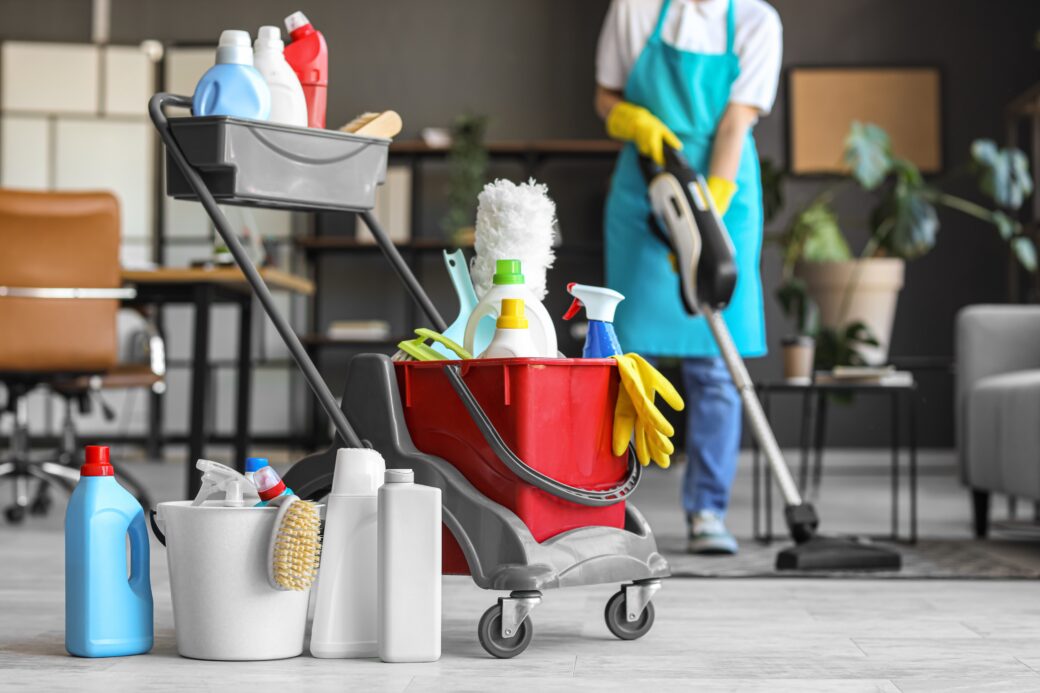A deep clean for an office goes beyond the regular cleaning routine to thoroughly clean and sanitize areas that are often overlooked or accumulate grime over time. It’s a more intensive, comprehensive cleaning aimed at maintaining hygiene, improving air quality, and providing a healthier work environment.
Here’s what a typical office deep clean includes…
Carpet & Upholstery Cleaning
- Deep vacuuming – Using specialized equipment to remove deep-set dirt from carpets and rugs.
- Spot treatment – Removing stains from carpets, chairs, and upholstery.
- Shampooing or steam cleaning – For heavily soiled carpets or upholstery, a professional deep clean may include a carpet shampoo or steam clean to lift dirt, bacteria, and allergens.
Window & Glass Cleaning
- Cleaning interior windows – Removing smudges, streaks, and dust from windows and glass partitions.
- Wiping down glass doors – Cleaning fingerprints, dust, and grime from entryway glass or office partitions.
Dusting & Surface Cleaning
- High-touch areas – Deep cleaning desks, countertops, and all surfaces, including often-neglected spots like light fixtures, ceiling fans, baseboards, and vents.
- Dusting corners & crevices – Thoroughly dusting areas like window sills, behind furniture, and in corners.
- Electronics cleaning – Wiping down keyboards, monitors, phones, and other office equipment with safe, non-abrasive cleaners to remove dust, bacteria, and grime.
Restroom Deep Cleaning
- Sanitizing all surfaces – Toilets, sinks, mirrors, and counters are sanitized and disinfected.
- Grout and tile cleaning – Scrubbing grout and tiles to remove soap scum, mildew, and buildup.
- Restocking supplies – Checking and replenishing toilet paper, soap, paper towels, and other essentials.
Kitchen & Breakroom Cleaning
- Appliance deep cleaning – Cleaning microwaves, refrigerators, dishwashers, and coffee makers, removing any built-up grime or spills.
- Cabinets and drawers – Wiping down the inside and outside of cabinets, especially in the kitchen area where food can attract crumbs and spills.
- Sanitizing surfaces – Cleaning countertops, tables, and any other high-touch surfaces, ensuring all areas are sanitized.
Floor Care
- Deep cleaning of hard floors – Sweeping, mopping, and using appropriate cleaning products to remove dirt and stains from tile, wood, or laminate floors.
- Polishing or waxing – For tile or wooden floors, a deep clean may involve polishing or waxing to restore shine and protect the surfaces.
High-Touch Areas & Deep Sanitization
- Disinfecting high-touch surfaces – Wiping down door handles, light switches, elevator buttons, handrails, and any other frequently touched areas with a disinfectant to reduce germs and bacteria.
- Air quality maintenance – Cleaning air vents or changing air filters to ensure proper air circulation and reduce allergens.
Specialty Cleaning
- Light fixture cleaning – Dusting and cleaning light fixtures and lamps to improve lighting quality and prevent buildup.
- Baseboard cleaning – Thoroughly cleaning baseboards, which can accumulate dust and dirt over time.
Organizational Touch-ups
- Decluttering – While not a full organizational overhaul, a deep clean might involve tidying up and helping to declutter common areas, such as waiting rooms or shared office spaces.
- Organizing common spaces – Straightening up magazines, mail, or other items in shared spaces like lounges or kitchens.
When Should an Office Have a Deep Clean?
- Seasonally – It’s common for offices to do a deep clean quarterly or twice a year.
- After major events – If the office has had a large meeting, conference, or party, a deep clean can help reset the space.
- As part of a hygiene initiative – If you’re dealing with a high number of illnesses or the flu season, a deep clean can help eliminate germs and bacteria.
Benefits of a Deep Clean
- Healthier environment – Reduces the spread of germs and allergens, promoting a healthier workspace.
- Improved productivity – A clean, fresh environment can boost morale and productivity.
- Long-term maintenance – Helps preserve office furniture, carpets, and fixtures, extending their lifespan.
A deep clean for an office is a comprehensive, more thorough cleaning process that tackles areas often missed during regular cleaning routines, ensuring the workspace is hygienic, organized, and looking its best.

Leave a Comment